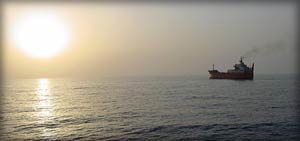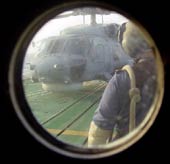404 Not Found

On Aug. 12, FRONTLINE producer Martin Smith, his co-producer Marcela Gaviria, and cameraman Scott Anger set out on a two-month journey that will take them from London to the Persian Gulf to Pakistan and Afghanistan in an effort to find out what has become of Osama bin Laden's terrorist network, Al Qaeda, since the U.S. launched its war on terrorism. In the weeks ahead, we'll be posting regular email dispatches from Smith and Gaviria as they report back to us on their progress, offering an unprecedented behind-the-scenes perspective on a FRONTLINE documentary in the making. Smith's report will air in mid-November.
 |
Traffic on the Gulf of Oman. (photo by Marcela Gaviria) |
"On Board the Algonquin"
17-18 August, somewhere in the Gulf of Oman
from Martin Smith
 | |||
A longtime, award-winning FRONTLINE producer, Martin Smith produced "Hunting bin Laden" -- first broadcast in 1999, then updated and rebroadcast immediately after Sept. 11. His other recent FRONTLINE reports have included "Saudi Time Bomb?," "Looking for Answers," and "Dot Con." | |||
The commodore explains the mission as deterrence. Thus far, he says, the four ships under his command, which he runs from aboard the Algonquin, have contacted -- or as they put it, "hailed" -- 17,600 vessels, most often by the ship's radio. And depending on a set of ever-changing tripwires, they have boarded and inspected a few hundred of those. Admittedly, the commodore tells us during an interview in his comfortable cabin, it's all more of an art than a science.
He says he thinks they are successful. "The word gets back to the bad guys that we're out here, and they stay in Afghanistan and Pakistan. We've closed the back door. This puts a lot of pressure on them." But it's hard to know exactly what is happening out here. In only a couple of instances have the Canadians actually arrested suspected Al Qaeda fighters. And, the commodore admits, there are boats that get through the net -- never hailed and never stopped.
The big tankers, the fishing trawlers, and dhows are easy. The captains and crews accept the presence of the war ships and their search parties. In fact, there is talk out here that their insurance carriers have lowered their premiums since the inspections began. In other words, the international war on terror is doing a great service for the oilmen. This should certainly make the U.S. president happy.
It's what they call the "go-fasts" where all the action seems to be. Long before Sept. 11, jobless Pakistanis, Afghanis, and Iranians, economic refugees, have paid smugglers to bring them safely across the Gulf of Oman to the beaches near Muscat, Oman. After a grueling 18-hour crossing in high heat without much food or water, they stagger ashore and, if not caught, eventually make their way to jobs in either Oman, the U.A.E., or Saudi Arabia.
Most all of the smugglers, says the commodore, operate out of Jask, Iran -- a port city we've now put on our itinerary. They move out in fleets of three boats -- each packed to the gunwales with 25 to 30 illegal migrants. Few travel with radios, fewer still with GPS.
It was on July 13th when the Algonquin came across three go-fast boats. Most often, they are too small to be picked up by the ship's radar. Instead, the go-fasts are usually identified visually with two powerful binoculars called "big eyes" mounted on balconies on either side of the ship's bridge. In hot, hazy weather -- which seems to be the only kind of weather here -- this is difficult work.
The commodore, a wiry little man with a high-pitched voice and a sharp mind, explains that on July 13th it was a French ship that first identified the three go-fasts. But he is confused. In fact, the ship's record will show that it was the Canadians that first spotted and gave chase to the boats. In most cases, the boats will routinely stop when they see the ships moving at them out of the haze. The sailors are not there to bust them for smuggling, and will bring the passengers fruit and water. If no fighters are on board, they'll be on their way after only a short rest break. In the months since November 2001, when these patrols began, the boarding teams have gotten to know most of the smugglers, and they are cooperative.
 | |
A Greek helicopter lands on the flight deck of the Canadian destroyer HMCS Algonquin patrolling in the Gulf of Oman. (Photo by Marcela Gaviria) | |
Although they stopped another go-fast only a few weeks later and detained another couple of men, the view of most of the sailors I talked to on the Algonquin was that only the July 13th arrests were really significant. By means that I can't divulge, I am able to get the name of one of the men -- I don't know if it's the older or younger brother. We hope to follow up in Afghanistan, Pakistan, and Iran to see if we can learn more about him.
Meanwhile, we wait aboard the Algonquin for another go-fast interdiction. But the weekend passes quietly. No more boardings. We film goings-on around the ship, interview the commodore, the captain, and some sailors. We watch "Monsters Ball" and "Meet the Parents."
< (previous dispatch) · (next dispatch) >
web site copyright 1995-2014 WGBH educational foundation
 |
· My Baffling Question/An Obedient Dissident · The Wedding Party · Arriving in Yemen · Inside the Kingdom · Indomitable · A Circle of Trust · The Next Big Get · The Madrassa · A Little Noticed Gun Battle · The Plight of Women · Frustrations · Faisal Town · Road to Nowhere · An American Informer · Don't Go to Timargarha · Border Town · In the Northwest Frontier · Prisoners' Dilemma · On the Road to Chitral · Rumors and Half Truths · Bombs or Dust Devils · Paranoid in Peshawar · We Believe in God · Nuclear Neighbors · Old Hash · A Firehose of Information · Dubai to Karachi · Like an Elephant Chasing a Mouse · On Board the Algonquin · HMCS Algonquin · Faces at a Dubai Mall · Armchair Jihadists · Zubaydah Is Dead · Preparations |